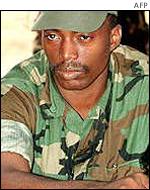Country profile: Democratic Republic of Congo
But a peace deal signed in December 2002 appeared to
signal the end of the four-year conflict, which pitted government
forces, supported by Angola, Namibia and Zimbabwe, against rebels
backed by Uganda and Rwanda.
Rights organisations estimate that 2.5 million people
have been killed, either as a direct result of fighting or because of
disease and malnutrition. It has been called possibly the worst
emergency to unfold in Africa in recent decades.
The war has had an economic as well as a political side.
Fighting was fuelled by the country's vast mineral wealth, with all
sides taking advantage of the anarchy to plunder its natural resources.
The history of DR Congo has been one of civil war and
corruption. After independence in 1960, the country immediately faced
an army mutiny and an attempt at secession by its mineral-rich province
of Katanga.
A year later, its prime minister, Patrice Lumumba, was seized and killed by troops loyal to army chief Joseph Mobutu.
In 1965 Mobutu seized power, later renaming the country
Zaire and himself Mobutu Sese Seko. He turned Zaire into a springboard
for operations against Soviet-backed Angola and thereby ensured US
backing. But he also made Zaire synonymous with corruption.
After the Cold War, Zaire ceased to be of interest to
the US. Thus, when in 1997 neighbouring Rwanda invaded it to flush out
extremist Hutu militias, it gave a boost to the anti-Mobutu rebels, who
quickly captured the capital, Kinshasa, installed Laurent Kabila as
president and renamed the country DR Congo.
Nonetheless, DR Congo's troubles continued. A rift
between Kabila and his former allies sparked a new rebellion, backed by
Rwanda and Uganda. Angola, Namibia and Zimbabwe took Kabila's side,
turning the country into a vast battleground. The government has no
control over large parts of the country.
| DR CONGO FACTS |
| Population: 52 million |
| Capital:
Kinshasa |
| Major languages:
French, Lingala, Kiswahili, Kikongo, Tshiluba
|
| Major religions: Christianity, Islam |
| Life expectancy:
47 years (men), 51 years (women) |
| Monetary unit:
1 Congolese franc = 100 centimes |
| Main exports:
Diamonds, copper, coffee, cobalt, crude oil
|
| Average annual income:
US $100 |
| Internet domain: .cd |
| International dialling code: +243 |
President: Joseph Kabila
Joseph Kabila was barely 30 and a political novice when he became
president in January 2001 following the murder of his father, Laurent.

Joseph Kabila: reportedly lacks his father's charisma
|
Within days of coming to power, Kabila surprised
diplomats and observers by declaring that he wanted to seek a peaceful
end to his country's civil war.
For many Congolese the young Kabila was an unknown
quantity. Unlike his father, he was perceived to be shy, unassuming and
quietly-spoken.
Joseph Kabila fought in his father's rebel army during
the military campaign that brought him to power. He went on to serve in
the army as major-general and chief of staff, and headed the government
forces in the fight against former rebel allies.
Joseph Kabila is the eldest of 10 children fathered by
Laurent Kabila. He spent much of his early life in East Africa, where
his dissident father lived in exile. He received military training in
Rwanda and Uganda.
Rebels and opposition:
DR Congo's largest rebel groups are the Rally for
Congolese Democracy (RCD) and the Movement for the Liberation of Congo
(MLC). The RCD received backing from Rwanda while Uganda supported the
MLC.
Under a peace deal signed in December 2002, both groups
will each have one vice president, along with the political opposition
and supporters of President Kabila.
There are many other rebel groups, usually ethnically-linked and with fluid political allegiances.
A government ruling in May 2001 allowed conventional
political parties to operate, as long as they informed the government
in writing that they intended to do so.
The press has been able to criticise government bodies,
and some publications serve as mouthpieces for opposition parties,
despite the fact that these were suspended shortly after Laurent Kabila
became president in 1997.
About 15 newspapers appear regularly in the capital, Kinshasa, and even more are published sporadically.
In addition, there are eight television channels and about 10 radio stations, five of which broadcast news.
Church radio networks are growing, but the state-controlled broadcasting network reaches the largest numbers of citizens.
The UN Mission in DRCongo (MONUC) and a Swiss-based
organisation, Fondation Hirondelle, launched Radio Okapi in early 2002.
The network's mostly-Congolese staff broadcast news, music and
information about MONUC activities. Radio Okapi aims to become the only
media outlet with national coverage and to enable dialogue across the
political divides.
A government ban on the rebroadcasting of foreign radio
stations was lifted in 2001. The BBC and Voice of America can be heard
in Kinshasa via Raga FM. Kinshasa listeners can also listen to Radio
France Internationale's broadcasts from neighbouring Brazzaville.
The press
L'Analyste - daily
Boyoma - daily
Elima - evening daily
Mjumbe - daily
L'Palmares
Le Potentiel
La Reference
Le Soft
Television
Radio-Television Nationale Congolaise (RTNC) - state-controlled terrestrial and satellite TV
Television Congolaise - government commercial station run by RTNC
Antenne A - private commercial channel
Canal Z - commercial channel
Canal Kin 1 - private channel
Canal Kin 2 - private channel
Radiotelevision Kin Malebo (RTKM)- private channel
Radio
La Voix du Congo - state-controlled, operated by RTNC, broadcasting in French, Swahili, Lingala, Tshiluba and Kikongo
Radio Okapi - UN-backed politically-independent network
Raga FM - privately-run network
Elikya - Catholic station
News agencies
Agence Congolaise de Presse (ACP) - state-controlled
Documentation et Informations Africaines (DIA) - Roman Catholic news agency
|
